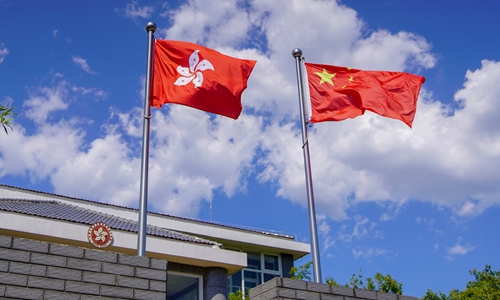HOME >> OPINION
US cannot cut off HK from the world
Source:Global Times Published: 2019/11/29 23:43:40

Photo: IC
After US President Donald Trump on Wednesday (US time) signed the so-called Hong Kong Human Rights and Democracy Act of 2019, some US politicians who had instigated the act excitedly made fanatical remarks on social media, and some Western media also participated in the chorus. Some people in the US and other Western countries have been deeply caught in an ideological frenzy. Their goal is not just Hong Kong. They try to make Hong Kong a pawn for them to contain the Chinese mainland.
Chinese public opinion has generally been tough and calm. Chinese people support the central government's pushback to such serious interference in China's internal affairs, warning the US that the move only leads to a dead end.
The calmness comes from Chinese people's clear understanding of Hong Kong's history and future and the great strength of China, making it impossible for Hong Kong to be a pawn of the US or the West. If some US politicians insist on walking toward a dead end, they will ruin US interests in the city. Although this may bring some trouble to China's development, it can never prevent China from rising.
The "one country, two systems" principle is not only in line with the interests of the mainland and Hong Kong, but also connects China with the West and with the world. It was an exploration and effort of all parties to reach a win-win situation under the mainland's relatively isolated condition at that time. Judging from Hong Kong's development and its current global status, the effort has been successful. The interaction between the mainland and Hong Kong is closer, and their connection with the world is wider. Development of global finance, economy and trade needs such connection.
It is extremely irrational for the US to launch the act. The US will also be a loser, and it does not lose any less than the Chinese mainland. According to the Congressional Research Service, the US had the largest trade surplus with Hong Kong in 2018 - $31.1 billion. About 290 US companies had regional headquarters in Hong Kong and another 434 had regional offices. This means the US has real interests in Hong Kong.
If the US is unwilling to pursue such common interests, Hong Kong may as well go another way that leads to prosperity. Hong Kong's status today was not given by the US, and the US cannot cut off Hong Kong's connection with the world. China is a large economy. Cities in the mainland such as Shanghai and Shenzhen have their unique positions in the global economic and trade pattern, and Hong Kong will also have huge room for improvement.
Today's US politics have somewhat been abducted by its extreme ideology. The US has become increasingly furious as it finds no way to improve its competitiveness. US Senator Marco Rubio, for example, is the most extreme nationalist and ideological fanatic. A person like him will not be welcomed by Chinese public opinion. However, such an extremist actually becomes a US senator, and US policy toward China is led by these people's sentiments. Social media is exacerbating such frenzy. US mainstream elites are also becoming tougher. These may drag China-US relations into a vicious circle.
The current anti-China sentiment in the US exceeds the anti-US sentiment in China. China knows well that the US is going to suppress it and we feel angry on some specific issues. However, China has not formed a comprehensive anti-US sentiment yet, nor has China launched policies to allow bilateral relations to deteriorate. China is not prepared to do so, either. Indeed, China will pay close attention to how far the US goes in this frenzy.
This is no longer the world in the early days after the end of the Cold War. The US cannot cut off China's connection with the world. Even if the US breaks relations with China, US allies will not follow it and most countries will keep developing relations with China. If the US insists on unilateralism and zero-sum game, it is choosing an irreversible decline for itself.
Posted in: EDITORIAL